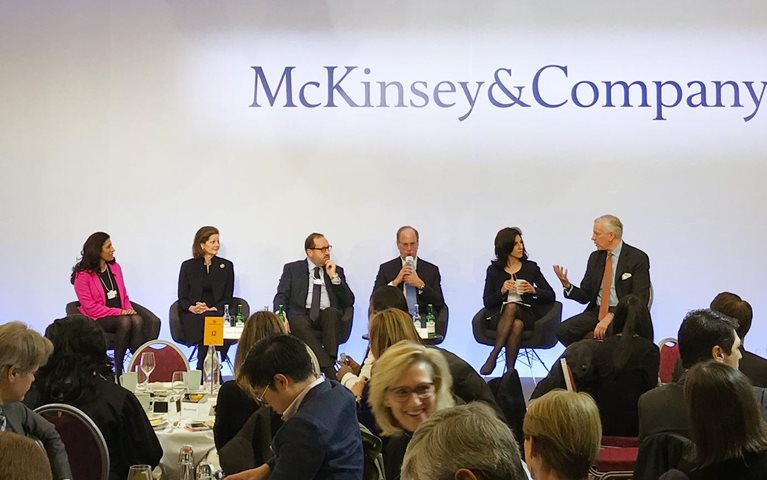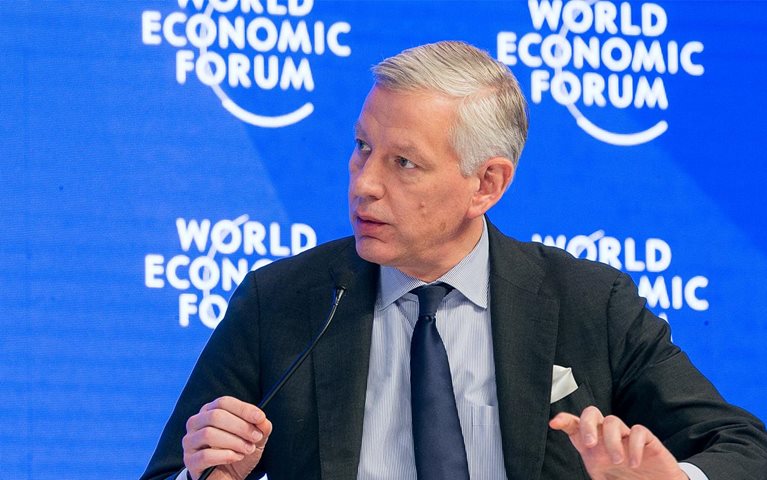What a difference a year makes. The forecasts for synchronous and sustained growth coming out of Davos 2018 seemed a distant memory last week, as a more cautious, trending-gloomy mood settled over 2019’s World Economic Forum Annual Meeting.
Last year, we were talking about repairing the roof while the sun shines. This year, it’s more about preparing for inclement weather.
a CEO in attendance
This was my first Davos as managing partner of McKinsey, and as the event concluded, I shared some thoughts in a “fireside conversation” with Rik Kirkland, our director of publishing.
Here are the four themes that I took away and that are captured in the video:
1. AI, AI, AI. It was almost impossible to walk into any room in Davos and not hear someone talking about artificial intelligence (AI) in all its forms. Executives around the world are beginning their journeys to place data and analytics at the heart of decision making, and I had conversations throughout the week with several who wanted to know how we approach that subject and what they should be doing.
Of course, these conversations brought with them complex questions, not all of them strictly business based. Questions like: What’s happening to privacy? Who owns the data? Where’s the consumer in all of this? And will the digital divide between those who have access and those who don’t lead to a more unequal world?
The companies who will ultimately be successful are those that find ways to lead on issues such as tackling data quality so analytics are meaningful and actionable, transitioning from “pilot purgatory” to fully scaled implementations, and delivering on the pace and scale required for continuous adult learning.
2. Geopolitics, tension, and trade. I spoke to dozens of CEOs last week, and I started each conversation with a simple question: “How’s business?” And the answer I got was pretty consistent: “You know, my business is pretty good. But I’m worried about everybody else’s.” My take: the underlying economics are actually still reasonably solid for most companies and sectors; however, the external environment is now more than background noise. It’s having an effect on how leaders are choosing to invest and to focus their teams.
Tension between the world’s biggest economies was on the minds of all delegates, and there was a lot of talk about the potential impact on supply chains. One of our latest McKinsey Global Institute (MGI) reports, Globalization in transition: The future of trade and value chains, was a big part of the discussion on all sorts of panels. I urge you to read it.
The report explains that, for the first time, emerging markets now make up 50 percent of the counterparties in global trade. While these markets are perhaps more optimistic about growth than many developed economies are, they face their own challenges as knowledge and technology replace labor as the critical sources of arbitrage in global value chains.
3. Good business is about more than just business. It’s clear that citizens are looking for leadership on climate change, inequality, and other social issues.
A lot of discussions reinforced what we have learned in our own research, which is that one of the best ways to deliver growth and inclusion is to continue making progress globally on gender parity.
Leadership is also needed on climate change. All the assumptions around global warming have, if anything, proven too optimistic. In fact, one of the week’s most memorable events was Sir David Attenborough’s impassioned and compelling speech that made it clear that “now’s the hour” to make a change, to set things right. As he observed, we are running out of time.
4. Jobs, reskilling, and retraining. A good general rule right now is that whenever a conversation about AI comes up, a conversation about jobs is sure to follow. That was especially true this week, as employers and policy makers all over the world look ahead toward the future of work and reskilling.
MGI has covered this topic extensively, but one of the things that our conversations in Davos made real this week was just how much the relevant issues differ by industry.
Here’s an example: a hospitality executive described the potential to move to self-check-ins at hotels, as airlines have, but did not expect a big reskilling need, given high employee turnover. But we also heard from a healthcare innovator, reliant on an aging supply-chain workforce with low turnover, who was wrestling with how best to get more midcareer employees to embrace new skills.
These issues are complex. But managing this transition well, as we have written in the past, “is not just a social good; it’s a competitive imperative.”
I’ll close with a favorite CEO quote from the week, a line that captured the mood at this year’s Davos. “Last year, we were talking about repairing the roof while the sun shines,” the CEO said. “This year, it’s more about preparing for inclement weather.”
For further reflections, watch these interviews with Reuters and Bloomberg.

